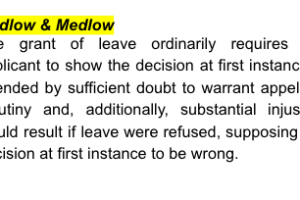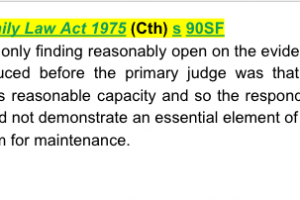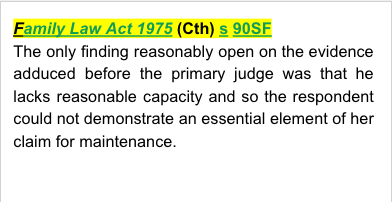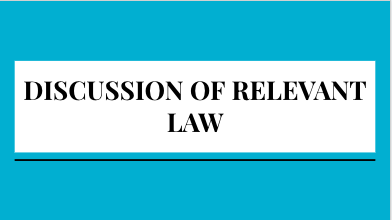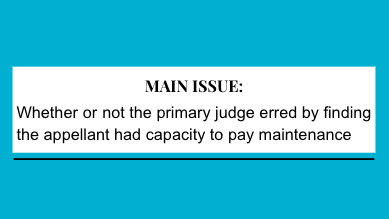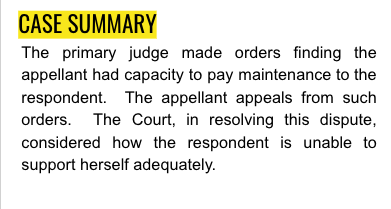- · 4845 friends
Appellant Disputes Interim Maintenance Orders

Gilmour & Hofte [2022] FedCFamC1A 111 (19 July 2022)

The primary judge made orders finding the appellant had capacity to pay maintenance to the respondent. The appellant appeals from such orders. The Court, in resolving this dispute, considered how the respondent is unable to support herself adequately.

Facts:
The parties’ de facto relationship of some 10 years duration ended in June 2018, but they continued to live in the same home with their two children until September 2019. The two children are now eight and nearly 12 years of age, both of whom live primarily with the respondent. Proceedings between the parties under the Family Law Act 1975 (Cth) (“the Act”) were first commenced by the respondent in February 2020. The parties seek relief of multiple types, including parenting, property settlement, maintenance, and child support departure orders – all of which applications are yet to be finalized.
The respondent sought interim maintenance orders against the appellant in her Amended Initiating Application filed on 29 April 2020 and her Application in a Proceeding filed on 17 January 2022. The interim maintenance dispute was heard by the primary judge across two days, with ex tempore judgment delivered on 4 February 2022. The appellant contends that the primary judge erred by finding the appellant has the capacity to pay maintenance. The appellant deposed to his financial circumstances in a financial statement filed on 25 January 2022.
In summary, his claimed expenses ($6,306) exceeded his income ($4,615) by approximately $1,691 per week. The appellant argued that even if his weekly expenses were notionally reduced by $1,100 per week, his reduced expenditure still well exceeded his income and so he still had no capacity to pay maintenance. The respondent’s application for interim maintenance meets the jurisdictional pre-conditions imposed by ss 44, 90SB, and 90SD of the Act. The respondent is unable to support herself adequately for several reasons: she has the primary care of the parties’ two children (s 90SF(1)(b)(i)); her employment skills are few and have not been meaningfully exercised for some years (s 90SF(1)(b)(iii)); and she is in the process of acquiring qualifications to re-enter the workforce in a different capacity to that in which she has worked in the past (s 90SF(1)(b)(iii)).

Issue:
Whether or not the primary judge erred by finding the appellant had capacity to pay maintenance

Applicable law:
Family Law Act 1975 (Cth) s 90SF - provides that the only finding reasonably open on the evidence adduced before the primary judge was that he lacks reasonable capacity and so the respondent could not demonstrate an essential element of her claim for maintenance.


Analysis:
In assessing the appellant’s capacity to pay maintenance, the primary judge notionally discounted his claimed expenses to save him approximately $1,100 each week. While the discount of some claimed discretionary expenditure was legitimate, it was not open to the primary judge to discount unavoidable expenditure on legal liabilities. Her Honour impermissibly discounted the appellant’s rental payments from $1,450 to $800 per week when he was legally liable for rental payments of $1,450 per week until June 2022. Until then, it was an expense he could not avoid.
If the respondent took her one-half share of around $135,000, she would have no need to call upon the appellant for financial support. However, the appellant objects to any further diminution of that capital sum, other than by regular withdrawals to meet the outgoings on the home now occupied by the respondent and the children. There is no injunction restraining the respondent from lawfully demanding the trustee to pay out her one-half share of the trust funds, but both parties have so far agreed to preserve those funds pending the determination of their property settlement dispute.
Conclusion:
The appeal is allowed. Orders 1 and 2 made by the Federal Circuit and Family Court of Australia (Division 2) on 4 February 2022 (amended on 10 February 2022) are set aside.
The appellant shall pay to the respondent maintenance of $583 per week upon the following conditions: (a) the first payment is due 7 days from the date of these orders; and (b) payments shall be made by way of direct deposit to the respondent’s account held with the A Bank, being account number 32.


